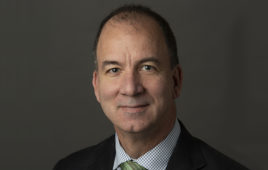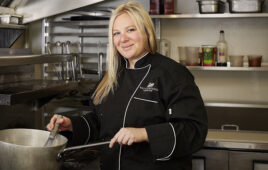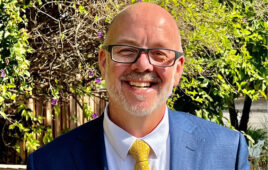Executive Chef Edward Leonard, CMC, uses annual “R&D” sessions to improve the food, menus, restaurants and staff at The Polo Club of Boca Raton.
Research & Development—or “R&D” as I call it—is not only for chain restaurants, manufacturers or big food companies. In fact, it’s perfect for clubs or any type of culinary operation. Throughout my career, R&D sessions have been instrumental to the success of the program—and the people.
Currently, we’re in our slower season at The Polo Club of Boca Raton (Fla.). We’ll gear up soon to start opening one restaurant every two weeks from October to November. Already various meetings for golf events, fundraisers and special events are taking place. The coming season is going to be busy. So it’s more important than ever that we are as prepared as possible.
Our mission statement and purpose statement talk about the importance of innovation along with craftsmanship and hospitality. Innovation is our relentless quest to raise the bar from the previous season, to make our menus better than the year before and to ensure our events truly “wow” our members and guests.
We begin each slow season by looking hard at what we’ve done in the past and what we can do to be better in the future. We look for new ways to excite our members with new dishes, concepts or a remake of the identity of the restaurant.
I don’t ever want members or guest attending an event at the Polo or dining in one of our restaurants and saying afterwards that the meal was good, but not as good as last year or last time. To me, this does not equal success. My goal is instead to make my members wonder how we topped last year’s member/guest or how our restaurants and menus get better each time they dine with us.
To achieve this goal, it takes a lot of work. So when it’s slow we take the time to ask:
- What worked and what didn’t last season?
- Where we can improve as a team?
- What are the new trends?
- How can we make food better from flavor to presentation to cooking methodology?
- What is the commercial sector doing around us and in major markets?
- How can we improve what we purchase along with what new products are in the market?
We get all the department chefs and team members fully involved as we explore the answers to these questions. Then we begin planning assignments, dates, time frames, and objectives.
During my time as Vice President of Le Cordon Bleu, I had to educate myself in the world of academia as training chef instructors, accessing classrooms and student engagement were big parts of my job. One of the things I realized during this time is that everyone learns differently. And since the key to a high-quality kitchen is rooted in your team, training and teaching are critical to success.
This quote from Ben Franklin has become a huge part of my teaching and training philosophy: “Tell me and I forget, teach me and I may remember, involve me and I learn.”
By involving my culinary team, they get a fuller understanding of my vision and quest to perform at a certain level. They get to contribute and have input and they learn by researching, thinking and planning. They have to present the food, pastry, breads and various dishes they create. A friendly competition is then sparked to see who can make the dish chef likes best and which ones will make it on the menu.
My R&D expectations are as follows:
- Improve innovation and quality – R&D can help you develop innovative and flavorful concepts. This doesn’t necessarily mean they have to be entirely new concepts. Many of our innovations here at Polo have been improvements on past dishes, dressings and desserts.
- Increase sales – Interesting presentations, station concepts, or upscale dishes from our R&D sessions should increase sales or help catering upsell.
- Give us a competitive edge – Through our sessions I believe we gain an advantage over our competitors and establish ourselves as leaders in the culinary field. The energy of the culinary team is raised. Their confidence and skill sets improve. We want our members thinking of Polo as the first choice of where to dine, not the commercial restaurants around us. By doing R&D, we stay on top of our members’ minds.
- Collaboration – Working together as a team is a key element of these sessions. It’s crucial to achieving success. Collaboration takes place between each chef and culinary team member at all levels. It also allows the transfer of skills and knowledge to be shared and embraced with a common purpose.
- Reputation – Engaging in these sessions is a great deal of work but it does strengthen our brand and reputation. Reaching the mountain is one journey. The ability to stay there is another. These sessions keep us moving forward and not resting on our laurels. I have a sign in the kitchen that speaks to this point. It reads: “Success can create failure.”
When we’re done with R&D in early October, there are over 300 photos, recipes and SOPs in our files. We have tasted, discussed, and lived food in a creative and high-energy environment that promotes pride without egos. It always makes the upcoming season easier to manage, too.
Before the season really begins, we have an all-day kick off meeting to review what we’ve accomplished, what we learned and to discuss the new direction for ourselves and our kitchens. At this point, we are now motivated and inspired. And that translates to everything we do.
There is no sense of achievement or success at the end of the journey. The journey is about always achieving and having success along the way. And R&D sessions are a big part of our annual culinary journey here at Polo.



